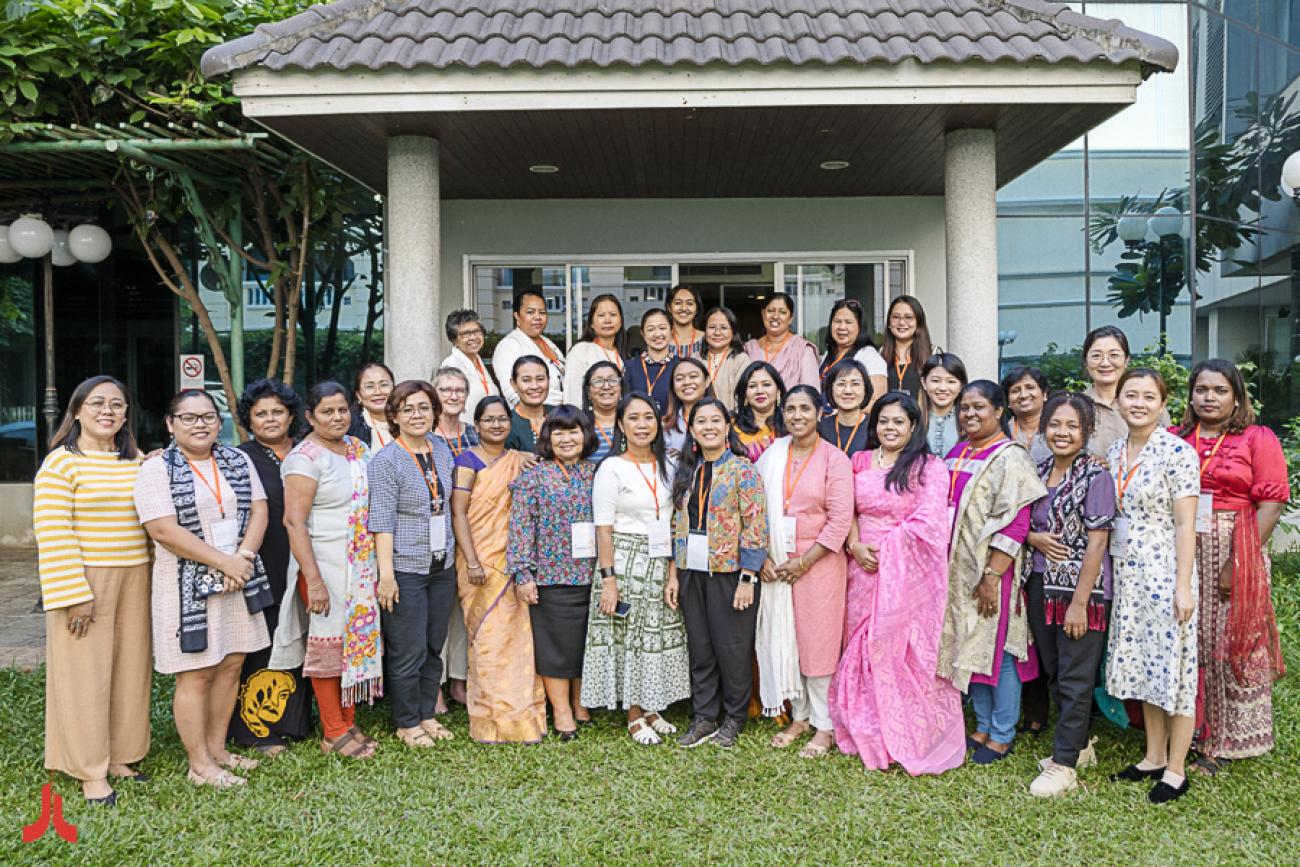Asian ecumenical women discuss intertwined crises of forced migration and gender-based violence

Participants of Asia Regional Consultation on 'Gender-Based Violence and Forced Migration of Women: Towards Strengthening Gender Justice Advocacy'
Bangkok, Thailand: Amid the rising challenges of gender-based violence and forced migration of women, the Asia regional consultation of the Christian Conference of Asia’s (CCA) Ecumenical Women’s Action Against Violence (EWAAV) programme is focusing on exploring the Church’s role in amplifying efforts to create a gender-just community that upholds women’s dignity and rights.
The three-day consultation on ‘Gender-Based Violence and Forced Migration of Women: Towards Strengthening Gender Justice Advocacy’ is taking place at the Bangkok Christian Guest House in Silom, Bangkok, from 19 to 21 November 2024.
Thirty-two participants from across Asia, representing the EWAAV network of CCA member churches, are attending the consultation.
Rev. Jung Eun Grace Moon, Programme Coordinator of CCA, opened the consultation by welcoming the participants and extending greetings on behalf of the CCA General Secretary.
The first day featured two thematic presentations offering critical insights and strategies for combating violence against women and gender justice advocacy.
Rev. Wella Hoyle de Rosas from Silliman University Divinity School in the Philippines delivered the first thematic address titled ‘Addressing Gender-Based Violence and Forced Migration of Women: Towards Gender Justice’. Drawing on experiences in the Philippines, Rev. de Rosas highlighted the pervasive challenges faced by women in Asia.
Rev. de Rosas analysed how patriarchal societal norms perpetuate cycles of violence and forced migration, dictating women’s roles and limiting their autonomy. Women fleeing abusive relationships or forced marriages often find themselves in exploitative labour conditions abroad. This interconnectedness of gender-based violence and forced migration creates a vicious cycle of oppression.
She emphasised the need for a gender-just community rooted in Christian values with theological undergirding, advocating for equality, mutual respect, and the inherent dignity of all individuals, inspired by Christ’s inclusive approach to women.
Drawing on the writings of Apostle Paul, which emphasise equality as central to the theological understanding of the Church as the body of Christ, Rev. de Rosas stated, “A vision of gender justice and equality is not just a theological ideal but a mandate, as a gender-just community envisions a society where equality, respect, and mutual flourishing transcend the boundaries of gender”.
In the second session, Rev. Ira Imelda of Gereja Kristen Pasundan in Indonesia explored evolving patterns of gender-based violence in Asia in her presentation, ‘Gender-Based Violence in Asia: Emerging Trends and Strategic Approaches in Addressing the Issues’.
Rev. Imelda addressed diverse forms of violence—domestic, sexual, cyber, and land-related—and their impact on marginalised communities. A case study on Papua’s food estate programme illustrated how land-related displacement exacerbates violence against women, especially indigenous women.
“For indigenous women, the loss of land is not just an economic issue; it is an attack on their dignity and way of life”, she added.
Rev. Imelda identified priorities for ecumenical women’s actions in areas such as intersectional advocacy, leadership training for women, and economic empowerment which are key strategies for tackling gender-based violence.
Emphasising the urgent need to champion faith-based messaging, provide pastoral care, and collaborate with governments to address systemic vulnerabilities, Rev. Imelda highlighted the interconnected challenges of gender, poverty, and displacement. She also stressed the importance of reminding congregations that “women have the power to empower women.”
The engaging discussions following both presentations, drawing from the diverse experiences of participants from across Asia, highlighted the need for collective action involving individuals, communities, governments, and national, regional, and international organisations.










